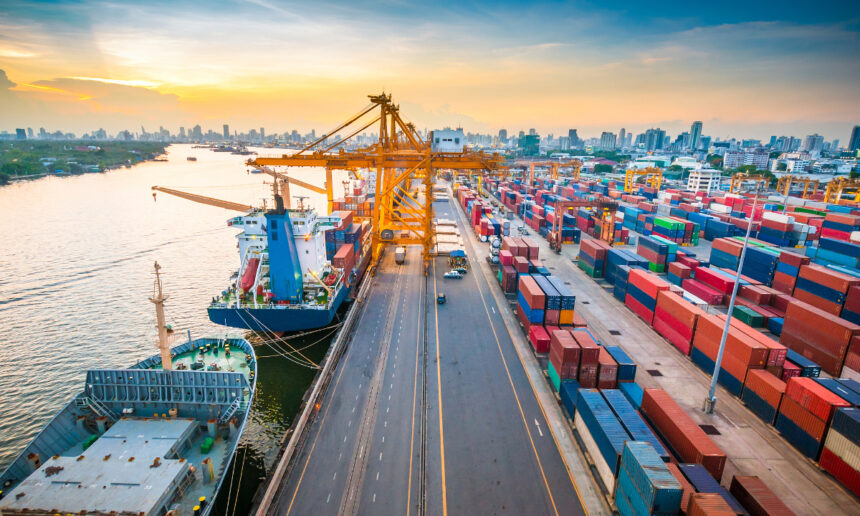China on Monday pointed out that taking an appeasement approach in trade deals with the US over its “reciprocal tariffs” does not bring “peace” and said it firmly opposes any deal between the US and its trading partners that comes at the expense of Chinese interests.
Chinese analysts noted that the reported move by Washington is hegemonic in nature and an attempt to suppress China. However, they pointed out that the US is unlikely to attract too many followers for this initiative.
In response to a question regarding media reports that said the US is preparing to pressure other countries to restrict trade ties with China in exchange for tariff exemptions, a spokesperson from China’s Ministry of Commerce (MOFCOM) stated on Monday that under the guise of so-called “reciprocity,” the US has been recently arbitrarily imposing tariffs on all its trading partners while pressuring them to engage in so-called “reciprocal tariff” negotiations.
China firmly opposes any deal between the US and its trading partners that comes at the expense of Chinese interests, the MOFCOM spokesperson said.
“This is essentially using the banner of ‘reciprocity’ as a pretext to pursue hegemonic politics and unilateral bullying in the field of international economy and trade,” the spokesperson said. “Appeasement does not bring peace, compromise does not lead to respect, and attempts to trade the interests of others for tariff exemptions are doomed to fail and will ultimately harm all parties involved.”
The Wall Street Journal reported the US administration’s plans on April 15, citing people with knowledge of the conversations. The report said that “the idea is to extract commitments from US trading partners to isolate China’s economy in exchange for reductions in trade and tariff barriers imposed by the White House.”
The BBC reported on Monday that the Trump administration has started talks with trading partners over tariffs, with a Japanese delegation visiting Washington last week and South Korea scheduled to begin talks this week.
US Vice President JD Vance is also scheduled to meet Indian Prime Minister Narendra Modi during a visit to the country this week. India faces a tariff rate of 26 percent if it is unable to agree a trade deal with the US government, BBC reported.
Gao Lingyun, an expert at the Chinese Academy of Social Sciences in Beijing, told the Global Times on Monday that the message is clear cut. China respects countries resolving their tariff issues with the US through bilateral negotiations. But China opposes such a deal if it includes sacrificing the interests of China, and won’t sit idly by if its interests are harmed in such deals,” Gao said, noting that nature of the US’ “restricting China” trade talk is hegemonic and an attempt to suppress China stemming from the US’ fear of losing hegemony.
China respects all parties that seek to resolve their trade disputes with the US through equal consultation, the MOFCOM spokesperson said, calling on all parties to stand on the side of fairness and justice, align with the right side of history, and uphold international economic and trade rules and the multilateral trading system.
China is ready to work with all parties to strengthen solidarity and coordination, jointly oppose unilateral bullying, safeguard respective legitimate rights and interests, and uphold international fairness and justice, the spokesperson said.
Hardly possible
The world’s major trading countries, which inevitably have close trade and economic connections with China, are unlikely to support the reported US plan, a Chinese expert said on Monday.
“Even if some trading partners of China may be ‘tempted’ to agree to US’ proposal, they would be in no position to do so, as it will violate their commitments to the WTO or other multilateral agreements the country is bound,” He Weiwen, a senior fellow at the Center for China and Globalization, told the Global Times on Monday, adding that such agreements are legally binding and cannot be dictated by other parties.
China has become a major trading partner of more than 150 countries and regions. These countries and regions, along with China, are required to abide by international rules and the international agreements that have been signed, said He.
Chinese analysts said the previous Biden administration had tried to isolate China by grouping its allies under the so-called “small yard, high fence” strategy without much success, while the current US administration, which pursues an “America First” policy, economic coercion and hegemonism, is even less likely to succeed as countries question whether the US will respect their interests.
In fact, many countries that have trade ties with both the US and China want to enhance their trade ties with China under the current global economic landscape, the expert said.
British Chancellor of the Exchequer Rachel Reeves said in an interview with The Telegraph that “China is the second-biggest economy in the world, and it would be, I think, very foolish to not engage. That’s the approach of this government,” Reeves said ahead of a scheduled trip to Washington, the Xinhua News Agency reported on Friday.
Japanese Prime Minister Shigeru Ishiba said on Monday that Tokyo will keep voicing “grave concern” over inconsistency between a bilateral trade deal Japan signed with the US in 2019 and US President Donald Trump’s latest automobile tariffs, per a Reuters report.
Over the weekend, the implementation of US tariffs further sparked domestic opposition within the US as the negative impacts have become more evident, with American scholars and economists calling for people to “reject harmful tariff policies”, and multiple sectors already buckling under the strain.
On China’s side, international businesses continue to eye the country as a key market amid the current uncertainties in the global trade landscape.
The recently held 5th China International Consumer Products Expo was attended by 65 Fortune Global 500 companies and over 4,100 consumer brands, a record high in its history. At the Canton Fair, nearly 73,000 booths are dedicated to export-related displays and the number of exhibitors has surpassed 30,000 for the first time.
The US’ action of unilateralism and protectionism has contrasted with China’s consistent efforts in expanding opening-up.
China has released a guideline for improving the country’s pilot free trade zones (FTZs) to further promote high-standard opening up and high-quality development, Xinhua reported on Monday.
The guideline, issued by the Communist Party of China Central Committee and the State Council, called for promoting the optimization and upgrading of trade of goods, invigorating the development of services trade, and supporting innovative development in digital trade.
Investment liberalization and facilitation should be advanced, and the level of opening up should be enhanced to attract and utilize foreign capital with greater efforts, said the guideline.












